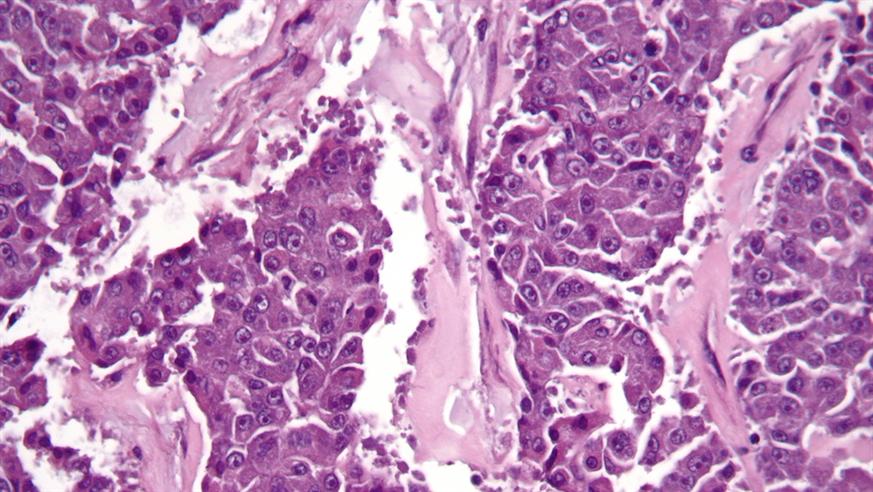
Very high magnification micrograph of a acinar cell carcinoma of the pancreas. Image credit: Copyright © 2013 Michael Bonert. License: CC BY-SA 3.0.
Scientists have developed a blood test that can pick out patients with pancreatic cancer who require different types of treatment to delay progression of the disease.
The test measures levels of just one molecule in the bloodstream – a tiny piece of RNA called miR-21 – to distinguish between high-risk patients with aggressive disease and those with slow-growing tumours.
Pancreatic cancer has one of the lowest survival rates of all cancers, and there is an urgent need for ways of personalising treatment by predicting what will work best for each patient.
Researchers at The Institute of Cancer Research, London, and The Royal Marsden NHS Foundation Trust assessed the new test in a small phase II clinical trial. The study included 17 patients who had inoperable pancreatic cancer which had not spread outside the pancreas, who received an initial round of chemotherapy followed by chemo-radiotherapy.
They found that patients with low levels of miR-21 benefited from this sequential treatment, which controlled their tumours for an average of 12.7 months.
Patients with high levels of miR-21 had much more aggressive tumours and the treatment failed after an average of only 3.5 months. These patients would instead require an alternative approach to their care.
The study, published in the journal Oncotarget, measured miR-21 levels using two different techniques in blood samples and found that it accurately reflected the levels of the molecule in tumour biopsies – demonstrating that miR-21 is a reliable marker for the disease.
The work was funded by the NIHR Biomedical Research Centre at The Royal Marsden and the ICR, and Pancreatic Cancer UK.
Currently, locally advanced pancreatic cancer is diagnosed by CT or MRI scans, but the new study suggests patients could benefit from measurement of their circulating miR-21 levels to decide upon the best form of treatment.
Study co-leader Dr Chiara Braconi, Clinician Scientist at The Institute of Cancer Research, London and Senior Clinical Researcher at The Royal Marsden NHS Foundation Trust, said:
“We have developed a blood test for locally advanced pancreatic cancer that could identify which patients are most likely to benefit from the addition of chemo-radiotherapy after chemotherapy.
“This test represents a step towards improving treatment for a disease that is often detected late, and is hard to diagnose, resistant to treatment, and has a very high mortality rate.
“Although our study is small, it explores the role of miR-21 as a marker for pancreatic cancer in a trial setting, and provides a rationale for testing miR-21 levels in larger groups of patients.”
Study co-leader Dr Ian Chau, Consultant Medical Oncologist at The Royal Marsden said:
“Even though our data are preliminary, I believe we are entering an exciting phase in the development of personalised treatment for pancreatic cancer.”